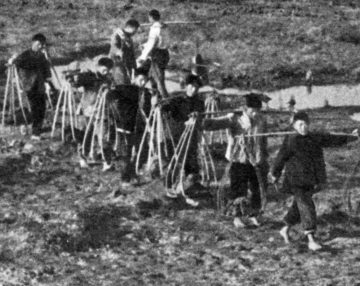Tania Branigan in The Guardian:
 In late 1968, the train and bus stations of Chinese cities filled with sobbing adolescents and frightened parents. The authorities had decreed that teenagers – deployed by Mao Zedong as the shock troops of the Cultural Revolution – were to begin new lives in the countryside. A tide of youth swept towards impoverished villages. Auntie Huang and her friends were among them. Seventeen million teenagers, enough to populate a nation of their own, were sent hundreds of miles away, to places with no electricity or running water, some unreachable by road. The party called it “going up to the mountains and down to the countryside”, indicating its lofty justification and the humble soil in which these students were to set down roots. Some were as young as 14. Many had never spent a night away from home.
In late 1968, the train and bus stations of Chinese cities filled with sobbing adolescents and frightened parents. The authorities had decreed that teenagers – deployed by Mao Zedong as the shock troops of the Cultural Revolution – were to begin new lives in the countryside. A tide of youth swept towards impoverished villages. Auntie Huang and her friends were among them. Seventeen million teenagers, enough to populate a nation of their own, were sent hundreds of miles away, to places with no electricity or running water, some unreachable by road. The party called it “going up to the mountains and down to the countryside”, indicating its lofty justification and the humble soil in which these students were to set down roots. Some were as young as 14. Many had never spent a night away from home.
These educated urban youth were to be reeducated. Their skills and knowledge would drag forward villages mired in poverty and ignorance, improving hygiene, spreading literacy, eradicating superstitions. But the peasantry’s task, in turn, was to uproot a more profound form of ignorance: the urban elite’s indifference to the masses. Mao had seized on the rural poor as the engine of revolution, bringing the Communist party to power. Now they were to remake this young generation – teaching them to live with nothing, to endure, even love, the dirtiest labour; to not merely sacrifice but efface themselves for the greater good. The reformed teenagers would bear his revolution to its ultimate triumph: a country whose society and culture were as communist as its political system.
More here.
